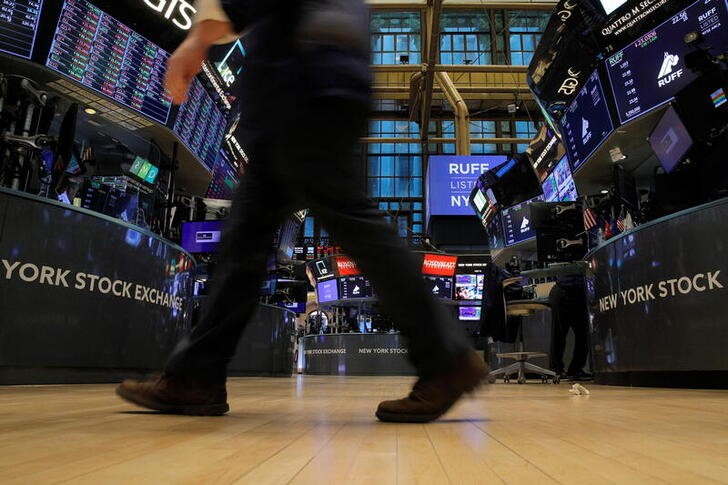What is gold’s rally signaling about the global economy? Barclays weighs in.
By Geoffrey Smith
Investing.com -- Disappointing guidance from Microsoft and Texas Instrument and a rare miss by Alphabet are casting a long shadow, especially over Meta Platforms, which reports after the close. Europe's banks are doing better - so much so that they may invite windfall taxes as governments scramble for funds amid the economic slowdown. The U.K. is going to take a couple more weeks to find ways to plug the gaps in its budget. Here's what you need to know in financial markets on Wednesday, 26th October.
1. Alphabet, Microsoft reports dent sentiment
Disappointing updates from tech giants Microsoft and Alphabet (NASDAQ:GOOGL) late on Tuesday are taking some of the steam out of the week’s rally in stocks in the overnight session.
Microsoft (NASDAQ:MSFT) beat expectations but warned of a clear slowdown in growth at its Cloud hosting business Azure, while Alphabet missed expectations by a wide margin, reporting sales growth of only 6% - that is, less than inflation - rather than the 9% analysts expected. YouTube in particular disappointed, with revenue falling 2% on the year, while the core Google search brand only generated a 4.2% increase.
The numbers reinforce the gloom created by financially weaker digital companies that also depend on advertising, such as Snap (NYSE:SNAP), and put the spotlight firmly on Facebook owner Meta Platforms (NASDAQ:META) when it reports this evening.
2. European banks profit from rates resurrection
European banks continued to report a broad rise in earnings, reflecting the European Central Bank’s belated move to raise interest rates during the summer.
Deutsche Bank (ETR:DBKGn) posted its best third-quarter result in over a decade, also profiting from the volatility in bond markets. Italy-based Unicredit (BIT:CRDI) also posted strong results, while Santander (BME:SAN) raised net profit by 11% on the year.
All three sets of figures were – like HSBC's (LON:HSBA) on Tuesday – ahead of forecasts and raise the likelihood of governments levying windfall taxes to fill the gaps in their budgets created by the energy crisis and the accompanying economic slowdown. Barclays (LON:BARC) missed out, however, as market volatility hit its U.S.-focused investment bank.
3. Stocks set for lower opening; Musk close to finalizing deal
U.S. stock markets are set to open lower thanks to the Microsoft and Alphabet reports, evidence that the slowdown is reaching even those megacaps that were long thought to be immune to the rest of the market’s problems.
Texas Instruments (NASDAQ:TXN) added to the gloom on Tuesday evening saying that it was seeing demand weakness broaden from the consumer electronics segment to the broader industrial one. Chipotle (NYSE:CMG) meanwhile warned that it is losing traffic as poorer customers run out of money.
By 06:25 ET (10:25 GMT), Dow Jones futures were down 41 points, or 0.1%, while S&P 500 futures were down 0.7%, and Nasdaq 100 futures were down 1.6%.
The early earnings slate is headed by aerospace and defense giants Boeing (NYSE:BA) and General Dynamics (NYSE:GD), along with Thermo Fisher (NYSE:TMO), ADP (NASDAQ:ADP), Bristol-Myers Squibb (NYSE:BMY), Kraft Heinz (NASDAQ:KHC), and Norfolk Southern (NYSE:NSC). Ford (NYSE:F) reports alongside Meta after the bell. Overnight, there were warnings of weak business ahead from brewing giant Heineken (AS:HEIN) and Mercedes (ETR:MBGn), while Europe’s largest gas buyer BASF (ETR:BASFN) upheld its forecasts.
4. U.K. needs more time to plug budget gap
Rishi Sunak is in no rush to add to the Gilt drama. The new U.K. Prime Minister has delayed announcing his fiscal plans by just over two weeks to November 17, giving himself more time to fill a funding gap that’s expected to be between 30 billion and 40 billion pounds a year due.
Sunak, who has already proved his commitment to balancing the books through higher taxes, is now likely to have to find spending cuts, at least in inflation-adjusted terms to meet the goal of a budget that will show debt falling as a share of GDP over the medium term.
Gilts, which have rallied sharply since the prospect of Sunak replacing the ill-fated Liz Truss became likely, gave in to profit-taking, with the 10-year yield rising 7 basis points to 3.70%. The pound rose 0.8% against the dollar to $1.1564, its highest since mid-September.
5. Oil drifts after API inventory build; U.S. data eyed
Crude oil prices drifted after Tuesday’s weak economic data from the U.S. were corroborated by a chunky 4.5 million barrel rise in crude inventories, according to the American Petroleum Institute. The U.S. government’s data are due at 10:30 ET as usual, and are expected to show an increase of only 1 million barrels.
Wednesday’s economic data appear unlikely to improve risk appetite, with new home sales expected to fall further and wholesale inventories likely to confirm a pattern of slowing final demand.
By 06:40 ET, U.S. crude futures were up 0.5% at $85.70 a barrel, while Brent crude was up 0.2% at $91.88 a barrel.
